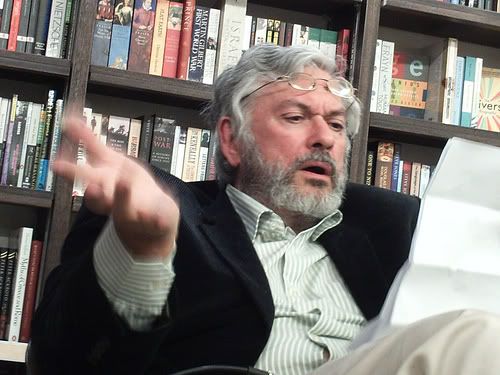
As always, you too can read the story here: "What Molly Knew"
There are things the story handles remarkably well, and things it doesn't. It was overly expository. It seemed to "tell" rather than "show" for the most part. But at last, we're in a story that has policemen instead of soldiers, working class poverty instead of famine, telephones instead of letters to nobody. A lot of my fellow bloggers have said this is their favorite story so far: I agree. It's still a major downer, but at least it's not poverty porn.
I feel like the story really hinges on how we, the reader, feel about Molly. I get the feeling the author expects us to sympathize with her, but I find myself disliking her immensely, never more than when she burns the letter her daughter wrote. That act perhaps functions better as a metaphor for colonialization; the colonial powers know what they did, they accept it, and then they attempt to absolve themselves of responsibility by ratcheting up or even creating tensions between disparate groups. So the powers arbitrarily divide India and Pakistan, moves Israelis into Palestine, invent racial disparity between Hutus and Tutsis, and so on. It's the most devious sort of scorched earth policy, where contemporary political scientists ignore the fact that the colonialists started it all, and just blame "racial conflagrations" instead.
But it basically tells me that Molly has no interest in her own agency. She's not being deprived of it; she could take that letter to the Inspector, she could get her husband thrown in jail, she could have listened and believed what her daughter had been trying to tell her for years. But no. She's utterly passive. She has no interest in her own fate, therefore it's impossible for me to have an interest in her fate. In fact, by burning the letter she actually decides to be active instead of passive, and to ACT AGAINST her own interest, the interest of her son-in-law, and continue to act against the interest of her daughter.
Rollo may have raped Sarah, but Molly could have stopped it at any time. And that makes her reprehensible. On a personal note, I very much believe that many of society's ills are accounted for by people acting flagrantly against their own rational self-interest, certainly in the United States at least. So it really bothers me to see Molly handicap herself in this way.
I feel like this might have been alleviated in two ways: first, Rollo could have been less of a cartoon villain. There is literally NOTHING redeeming about him. And I'm sorry, hunger pangs do not overall fear of nightly beatings and rape of your daughter unless there's some other attraction to him. But there isn't. Second, Keegan could have clarified the relationship between Molly and Sarah. That relationship never comes alive to me, it's never clear why Molly would simply sacrifice her for her own contentment/survival. The author keeps saying how much Molly loves Sarah, but nothing she does is an act of love toward her daughter.
All that said, I did enjoy the mystery around the son-in-law. We really don't get to know him very well, but what we do learn makes me want to know more. His internal contradictions are lovely ways to show how race and nationality aren't as clear-cut as we like to think.
Feel free to weigh in in the comments. How did you feel about this story? About Molly?


Interesting take. I wondered Rollo-Molly is Whites-SouthAfrica? Molly's burning of the letter as Nelson Mandela simply saying 'screw it, let's all live together'?
ReplyDeleteI liked this story as well, though I disliked Molly. Despite that she was in an abusive relationshop, I couldn't bring myself to liking her becuase she refuses to take responsibility for her own situation and Sarah's - preferring to live in denial.
ReplyDeleteI think the Retiefs don't only represent White South Africa, but the whole of South Africa's contradictions and denials.
question-do you see The White Tiger by Aravind Adiga as "poverty porn"?-thanks for posting on my blog on this topic and after reading at least all the short listed stories and hopefully the 12 other stories included in this years book-I will do a post on poverty porn-the Indian author I have been reading a lot of lately is R. K. Narayan whose work I love writes of the poor but in a way that is very much not poverty pornography-or at least I thing so-
ReplyDeletein truth as I read the story I wondered why Molly did not consider trying to find a job? would that be a far fetched idea in the world of the story?-some say evil comes from laziness
ReplyDeleteI think White Tiger is one of the WORST offenders.
ReplyDeleteR.K. Narayan is precisely the opposite, I feel. He writes about how people actually live, about their gainful employment, about how they find honor and happiness despite imperfect circumstances. He is writing about an India that is real, rather than a fantasy India.
Yeah, the fact that Molly didn't even attempt to find employment did not impress me.
ReplyDelete